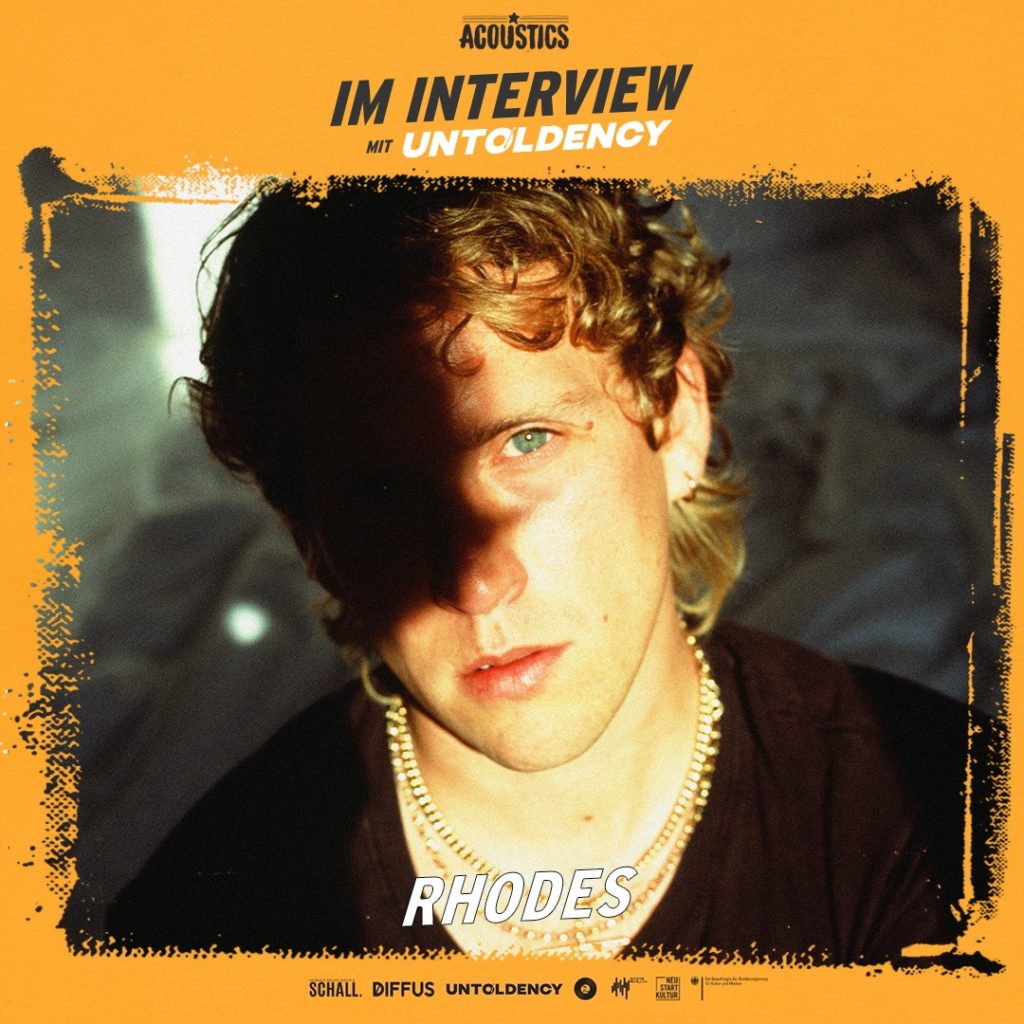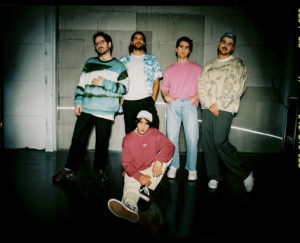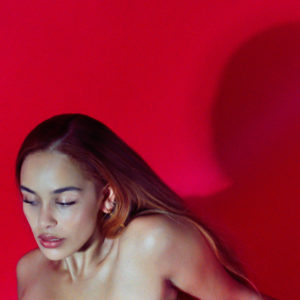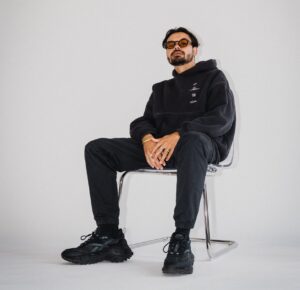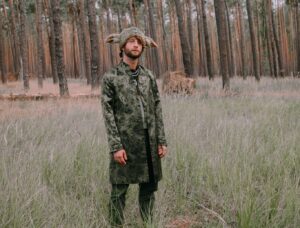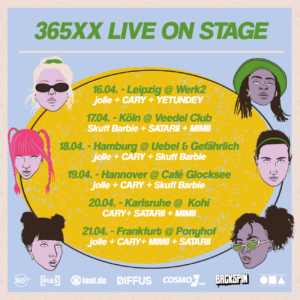Die Acoustics Concerts 2022 sind mittlerweile im letzten Drittel angelangt und neigen sich langsam, aber sicher dem Ende zu. Leider mussten zwischendurch ein paar Konzerte aus diversen Gründen abgesagt werden und somit bleiben noch neun Gelegenheiten im August, um Mittsommernächte den perfekten Soundtrack zu verleihen. Bis jetzt gab es eine Menge schöner Konzerte mit wunderschönen Settings und traumhafter Musik. Das versprechen auch die Konzerte, die noch darauf warten, besucht zu werden. Aus Erfahrung kann ich sagen: Es lohnt sich! Kauft Euch diese Karte und seid bei einem der zauberhaften Konzerte mit dabei! Neulich, am 12. August, war ich selbst in Essen und habe mich von einem der Acoustics Concerts überzeugen lassen. An diesem Abend wurde es unter anderem mit Rhodes sogar ein wenig international. Ich hatte das Glück, den britischen Musiker ungefähr einen Monat zuvor per Videocall interviewen zu können. Rückblickend war es ein unfassbar schönes, emotionales und privates Interview mit viel Sentimentalität und Selbstreflexion. Aber lest selbst:
About escape and sanctuary
Leif: Hello I’m Leif from music magazine untoldency, nice to meet you! How are you doing and how was your day so far?
Rhodes: Thanks man, I’m doing good! Right now, I’m in London spending two weeks of time between touring. I have a little studio room here, where I can work on any ideas maybe for the next album.
Leif: Sounds very creative then!
Rhodes: Of course! Right now I’m spending most of my time doing songwriting and working on new ideas.
Leif: First of all: How do you want to be called? Rhodes or David?
Rhodes: Rhodes will do fine.
Leif: Alright then, Rhodes. This is going to be a little introducing interview about yourself, and I would like to put focus on your music and how you came to make music but also on some of your new songs, if it’s okay for you. But since this is an introducing interview, would you please introduce yourself and tell me how you would describe your music to poeple who never listened to your music before?
Rhodes: I’m a kind of ballad songwriter. So, most of my music is quite cinematic, introspective, heartfelt, real-life stories about struggling with those feelings of doubt, anxiety, and depression. But also, I really strive to bring an element of hope with my music, because music was my saviour when I grew up, and it still is my escape and my sanctuary. I hope that my music provides a bit of an escape for the people who hear it.
Leif: I think especially in the new releases you can listen to this dealing with anxiety and as you said there’s always a little hope in your songs. But let’s go back to where it all started. How did you get in touch with making music for the very first time and how did it go on?
Rhodes: I grew up with a very musical and creative household. My dad played guitar and I grew up watching him play and wanting to pick up a guitar as soon as I could. I actually still write and record most of my songs with his old guitar. It still is my main tool in the studio. That was really fortunate, and I think because I was surrounded by that I had this expansive and beautiful musical collection from a really young age. Even in primary school I used to try it and get a group of friends together and play whenever I could even if I could imagine that it sounded absolutely terrible. I’ve been in bands throughout my teenage years and when I moved to London for uni I started to play in more serious bands. We took ourselves more seriously and tried to get out there and do it for real. It was during my early twenties when I started to write my own music and although the guitar is my first instrument, somehow, I found myself playing bass in some bands. I started to really get lost into my own creativity, so I left that band and started to write my own songs. They were very small and very strict it was just like vocal and guitar, but it put together some bedroom demos.
“You have to be honest with yourself, you have to be honest with the song”
Leif: You are from England. Did your origin affect your way of understanding music and writing songs in general?
Rhodes: I grew up in a small town just outside of London and it was very much one of those towns where wasn’t really much to do. Also, when I was young, I had a kind of fractured home life because my parents lived apart. That all formed my need for music. And looking back now and seeing a lot of my friends and what they’re doing, music is a huge part of everyone’s lives. I think living so close to a major city like London always felt like it was on my doorstep all the time. So, the big dream was always to go to London and do a show. That was what everyone was working for. The way I grew up and where I grew up gave me the feeling that it was possible and that it is down to you that you chase your dreams.
Leif: Speaking of songwriting: In your opinion, what are the most important ingredients when it comes to writing a good song?
Rhodes: This is a good one. Because I think it is easy to get caught up in writing something that you think people want to hear. I’ve been signed to major labels, and I’ve been there, I’ve done that, and I’ve tried to do the thing that I think will please anybody. But actually, I think the most important thing – especially with the kind of music that I do – is honesty. You have to have honesty, you have to be honest with yourself, you have to be honest with the song. And you have to almost allow those initial, great ideas to hit you and then you have to nurture them.
Leif: With that being said: Are your songs rather biographic or is it mostly storytelling?
Rhodes: They’re biographic. They have evolved through the years. I have experimented with different things. Since opening my eyes up to collaboration and working with different people I’ve tried to explore this idea of storytelling and using my experiences to try and highlight things that other people might be feeling. But almost every song I’ve ever written comes from my own experience, so they’re mostly biographical.
Leif: So, with the biographical songs mixed with the honesty you mentioned before you aim to create a specific intimate feeling, right?
Rhodes: You can write ten songs about the same thing. It’s those moments when you land upon a really powerful statement. And then you can write a song around that. Some of them are more playful than others. Some of them are deep and introspective and hard to write. And on my next record I experimented more with the fun songs to write. But ultimately, I believe my favourite songs are the ones that I write in the middle of the night feeling nostalgic and melancholy. I try to capture these emotions I feel like everybody relates to. Because we might not tell the same stories, but the feelings stem from the same experiences. We’ve all experienced heartbreak and we’ve all experienced anxiety. And whilst we might not have all experienced things like, you know, depression, and medically kind of diagnosed mental health conditions, we’ve all experienced low days, we’ve all experienced these feelings of doubt and hopelessness. And I think, that’s a very important place to draw inspiration from because you can take that sadness and turn it into something positive, which is a song. And the song can help other people as much as it helps you. Just getting it out and just laying it down, creating something from nothing. That’s the best feeling, man. Like, that’s an amazing feeling. And if that day, you’ve spent labouring over this idea, and this feeling that you have inside can connect with someone else. That’s it’s just an incredible feeling.
100 conversations at once
Leif: It is, it really is. You can tell that there is a lot of deep and personal emotions going on in all of your songs and especially the new releases float between being truly in love and self-doubt. Would you consider yourself emotional or overthinking?
Rhodes: Yeah, 100%. Like I, I’m deeply, deeply emotional, and connected spiritually to every nuance around me. I’m very affected by things and very affected by people and my relationships. And, you know, I’ve been affected by life just up to this point. We all carry trauma with us. And it’s difficult to let go of things. And they resurface, and they kind of come back and you find yourself in these, kind of, downward spirals. But I think ultimately, I do have amazing people in my life, and I do have amazing relationships, and I’m very grateful for them. And I acknowledge them a lot in my songs. I don’t know why I don’t know if there’s a reason for that. But I do. I do write a lot of songs about my love for people and how they affect me and the way I know I should be living my life. I also have ADHD as well, which is like a neuro diverse kind of condition that I’ve had since I was a kid. So, my head is just absolutely thinking all different outcomes or different possibilities, every single emotion, 100 conversations happening at once in my in my mind. It’s really easy for me to just absolutely downward spiral into these, kind of strange, murky depths of my brain and just like trying to figure stuff out. But luckily, I have people around me who can pull me out of that. Yeah, very important. And I guess that inspires quite a lot of my music.
Leif: Alright. Yeah, your new song suffering? Yeah, I love the song. By the way. It’s a really good one.
Rhodes: Thank you so much.
Leif: “Suffering” is about the fear of hurting another person and the fear of not being enough because of the own doubts and mental state, I would guess. What advice would you give a person in that very situation?
Klicken Sie auf den unteren Button, um den Inhalt von Spotify zu laden.
Rhodes: Well, I think it’s tricky. I mean, you’re right. That is what it’s about. Ultimately, it’s about just not wanting to hurt somebody. But kind of knowing that you are, or you have. If someone’s in that position, I think it goes back to the honesty thing. You have to be honest with yourself. You have to be open, you have to be able to talk to somebody that you love, you know, I find that’s really important. I also find it really strange that it’s just not how a lot of people are. Some people are very, very closed and that makes it difficult to communicate. And I think people can end up running away from things whether that be with drinking, going out partying or just like having a relationship share it with someone and then just letting it break down and leaving. Because you’re unable to actually articulate the way you really feel, or you’re scared of what they might think. And yeah, I’ve been guilty of this in the past before just like running away from stuff, running away from my problems, and just not facing up to stuff. And I ended up making it worse. And that’s what the song is about. The message is, well, the message is clear in itself, but I think beneath the surface, it’s a song about what I would want to say to somebody, if I was in that position. I was, I knew I was making mistakes, I knew I was hurting somebody. And then the ultimate bottom line is, I don’t want to hurt this person. “I can’t, I don’t want to hurt you. So, I’m being honest with you. I’m being open with you about the way I feel.”.

Mit dem Laden des Videos akzeptieren Sie die Datenschutzerklärung von YouTube.
Mehr erfahren
Leif: That’s really an important message. It sounds very reflecting and grown up. You beautifully managed to wrapped that into a song. In „The Love I Give“, another great song, you sing about the ups and downs in a relationship. Regarding love and life in general, do you think there is a no-good-without-bad-ying-and-yang-balance? And if so, why is that?
Rhodes: Yeah, I really do think there is this kind of quest for happiness going on the whole time. And we’re all constantly told about this certainly is this inner peace kind of feeling. And to me, that’s hard because there are going to be struggles, there always will be. And it’s not going to be easy. A lot of the time, it’s going to be hard. A lot of the time it’s going to be good days and bad days. And I think you have to try and find a way to find balance in life, that’s for sure. But when you are happy, it’s important to just take hold of those moments and keep them and make them sacred and understand that happiness isn’t a moment. It’s not a constant state of being either. I don’t think anyone can be that. It’s just not how we’re programmed. Especially if you’re an empathetic person. And you’re constantly faced with what’s going on in the world. You are going to agree and disagree with people the whole time, you’re going to have to deal with things in life. It’s just impossible to imagine life without those hardships. But I think what it goes down to again, is just this feeling that, as long as you have people around you, who you love and who you trust, it goes the other way as well. You have to be that to somebody else too. You have to be somebody else’s rock. You know, even if that’s a friend or a partner, it’s important to make sure that you give out what you what you want to have back. We’re all going to have moments where we are feeling like a terrible person, and you’re going to make mistakes and you’re going to have things. But then, that’s what life is. It’s about experiences and it’s about learning and about working through those things. And that’s what the song really is about. It’s about “listen, I’ve got to tell you that this is how it is. But just know one thing, I love you. And this is what’s going to admit, and this will always remain there for you. Like, I’ll always be there for you. Just don’t beat yourself up on the bad days.”. That’s the sentiment. I do. I do think there is this kind of yin yang thing. It’s just always been there written into folklore and into religion and into everything. So, it is always going to be that. It’s just one of those.
Just me on my guitar
Leif: I totally agree on that. Coming on to the acoustic concerts. You are going to perform 7 shows during the acoustic concert series for example in Dresden, Berlin, and Hamburg. What do you like most about performing acoustically or unplugged?
Rhodes: It’s amazing. It’s like music at its rawest form. One of the things I’ve really experienced first-hand is taking things all the way to the highest possible level of production, and then stripping it right back down to nothing. And the experience you get when it’s stripped right back down to nothing is incredible. When you’re playing a stadium, when I’ve played big arenas and big festival stages, you need a bit more of that production behind you when you’re onstage because it’s just so vast and big. Also, to hold people’s attention. I did a tour with Hozier back in 2016. And I played a bunch of massive arenas with him all around the world. And it was just me on my guitar. I was really lucky during that, because it showed his fans wanted to see someone with a guitar playing their songs. And they were there for a beautiful, peaceful spiritual experience. They weren’t there to party and get wasted. Because it’s Hozier, you know. But when I was up on that stage, I was like “Shit, you can do this just with a guitar.”. You don’t need a whole thing where I am in my career – I’m rebuilding from COVID, having these two years. I can’t wait to get on to these intimate little stages and just with a guitar and I’d bring a piano as well. I think the set is only half an hour every night. It’s just about me getting out there and showing people my voice and my songs in their rawest form. And they can really hear them. I love to perform like that. It’s great.
Leif: But I think those are the hardest, like the most intimate concerts in bars or something with like 20 people in it. Those seem the hardest to me.
Rhodes: Yeah, they are. They are the hardest. But it’s one of those things where it’s like, you’re pushing yourself to really be in the moment. And to really experience the whole thing with everyone else who’s there. Sort of, when I’ve done a big show or a big thing before in the past, people are like “Are you scared up there?” and I’m like I literally can’t see anyone when the lights are off and the spotlights on. I can’t see anybody out past the front row. So, it’s not scary at all. But when you’re in those smaller places, you can see everybody. You can see the guy in the back talking, like “Oh shit, you’re just talking did you enjoy it?”. But these are just the things that we do. I think back to one of my favourite artists of all time, Jeff Buckley. He started his career playing in coffee shops. So, it’s like, he’s playing in coffee shops, to people who are talking, chatting, doing other things, making coffee, ordering coffee, and he’s just playing. I love that. I think it’s really cool. And plus, at the end of the day, everyone’s going to be there to watch. That’s why they’re going to go buy a ticket. It’s going to be one of those things, I hope, where people want to enjoy it and not like talk the whole time.
Leif: That’s true. Also, it would be quite disrespectful. As we do in all of our interviews, the last question is about an untold story. Is there any story, sidenote or fun fact of you, that you never told anybody and want to share with us right now?
Rhodes: Oh my god, you’re putting me on a spot!
Leif: I do!
Rhodes: I have told this story before in the UK but not to Germany. When I was growing up, I had a really, really, really deep intense fear of singing. I don’t know what it stemmed from, but I resigned myself to just being a guitar player. And then it was my stepmother who pretty much begged me to sing a song with my dad on his 50th birthday party. I got up on stage and I was really drunk, and I sang “Crossroads” by Cream. And everybody loved that, and everybody wanted me to sing that again. From that day onwards, I was like “Okay, I think I can do this.”. That was my first experience of singing, like, the first time being on stage and opened my mouth and sung anything. Then I wrote two songs and one of them was the one that got me signed as a singer. I don’t know if that’s interesting enough, but I hope that it’s inspiring to somebody. Because I feel like so many people are afraid of expressing themselves. I know that it makes you feel naked and it’s very exposing. But if people are afraid of it, they just shouldn’t be, do you know what I mean?
Leif: I do. But I can totally relate to the feeling of being exposed while singing or even performing. Otherwise, I think the story you told us is really helpful and inspiring to those who feel like this.
Rhodes: I’d say you just gotta do it!
Leif: With that being said, we came to the end of this interview. I am looking forward to these beautifully emotional concerts in august! Thank you for your time, I hope you enjoyed it a bit! Also thank you for this amazing interview, it was fun to me!
See you on august 12th in Essen!
Rhodes: I did! I really enjoyed it. Thank you so much and I see you in Essen on the 12th!

